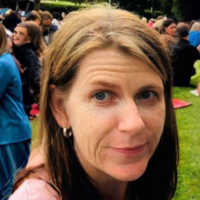
World Mental Health Day profile: Kat Baxter
10 Oct 2025
Profile
Meet Kat Baxter, Lived Experience Educator at Queensland Centre for Mental Health Learning.
1. Tell us a little bit about yourself
I live in Queensland with my beautiful wife and two dogs. I used to be a chef, so I love cooking for friends and family. I like camping, getting into nature, especially around water and I'm very passionate about sports and eating healthy.
2. You’ve been working as a lived experience peer worker for over eight years. What first drew you to this role, and what keeps you motivated in the work?
To be honest I didn’t know what a peer worker was until my wife explained it to me. I always had a drive to help others navigate life. I wanted to share my lived experience expertise and tools with others to help them navigate the system, the world and themselves. What motivates me to do this work is the therapy that comes from the connection itself. I have seen people find hope and pull themselves out of dark places, all they needed was someone who would role model hope and believe in them.
3. You’ve facilitated and co-facilitated many therapeutic groups. How do you approach creating safe spaces where people feel supported and heard?
I create safety within group work by collaborating with clinicians, really showing the therapeutic relationship and how we both can bounce off one another by breaking things down, sharing parts of ourselves that are safe and parts that humanise the consumer’s experience. I advocate for lived experience peer workers to have the opportunity to facilitate and co-facilitate with clinicians in those positions.
The approach is remembering we are not the experts in the room, making space for power to be shared by stepping back and opening up opportunity for voices to be heard. I think it's important to be aware of the power we hold, not just as peers but in the systems, we work in and how that power and knowledge is shared.
4. Through your time with Queensland Health, you’ve supported people in both inpatient and community settings. What have you found most rewarding about walking alongside people in their recovery journeys?
Seeing people stay out of hospital and thriving is incredible. I have worked and cared for people in their most vulnerable states, seen them grow and then become peer workers themselves. This recovery journey to watch and witness has been very rewarding.
5. Why do you think it’s so important for services and professionals to learn directly from people with lived and living experience?
As professionals we can have all the knowledge in the world but being able to really connect with people is a skill. It allows for a space where professionals share the power and they're not the only expert in the room. Where professionals work and integrate knowledge and skills of lived experience where a more meaningful, therapeutic relationship can be achieved.
6. For you, what does World Mental Health Month mean, and why is it important to highlight the voices of people with lived and living experience?
It's about acknowledgment and recognition of the people that have advocated for human rights and social inclusion. It also is about reducing stigma about mental health and acknowledging that everyone in the world may experience some kind of mental distress and there is no shame.
7. For people who are thinking about stepping into lived experience work or advocacy, what advice would you give?
Make sure you are ready, ready in the sense that you're at peace and in a place within yourself that you can role model hope. That you are able to use your lived expertise as your skill set and use it safely. Having lived experience is not enough, it's about what you do with it that makes the difference.
More news & views
 19 November 2025
19 November 2025
Professor Kane Vellar is an inaugural Rural Champion, representing Monash Modified (MM) regions 5–7.
 17 November 2025
17 November 2025
Associate Professor Ravi Bhat AM Associate Professor Ravi Bhat AM is an inaugural Rural Champion, r...
 14 October 2025
14 October 2025
Kirsty Rosie is the College’s Lived and Living Experience Advisor (Carer). She shares her thoughts o...